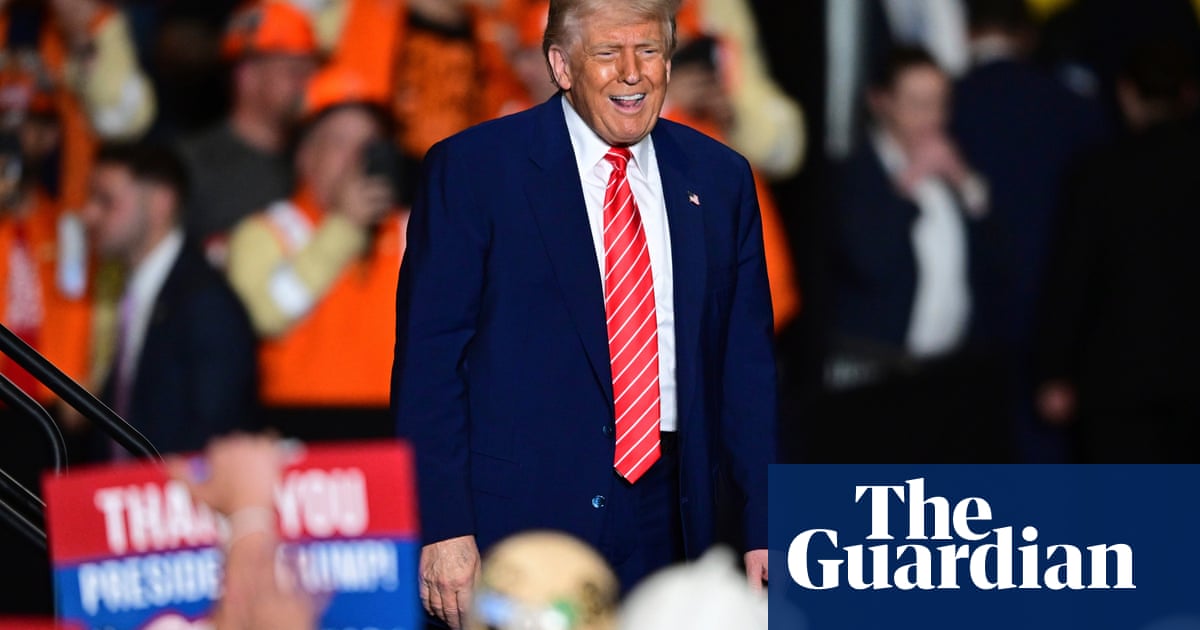Donald Trump announced on Friday he was doubling foreign tariffs on steel imports to 50%, as he celebrated a “blockbuster” agreement for Japan-based Nippon Steel’s to invest in US Steel during a rally inPennsylvania.
Surrounded by men in orange hardhats at a US Steel plant in West Mifflin, Trump unveiled the tariff rate increase, declaring that the dramatic hike would “even further secure the steel industry in the United States”.
“Nobody is going to get around that,” Trump said, of the tariff rate hike from what was 25%.
In a social media post after the conclusion of his remarks, Trump announced that the 50% tariffs on steel would also apply to imported aluminum and would take effect on 4 June.
“This will be yet another BIG jolt of great news for our wonderful steel and aluminum workers,” he declared in the post.
It was not immediately clear how the announcement would affect the trade dealnegotiated earlier this monththat saw tariffs on UK steel and aluminum reduced to zero.
During the event, Trump invited members of the local United Steelworkers union onto the stage with him to promote the Nippon deal, which saw its leader break with the union to support it. Praising the president, Jason Zugai, vice-president of Irvin local 2227, said he believed the investments would be “life-changing”.
But the powerful United Steelworkers union remained wary.
“Our primary concern remains with the impact that this merger of US Steel into a foreign competitor will have on national security, our members and the communities where we live and work,” United Steelworkers president David McCall said in a statement on Friday. “Issuing press releases and making political speeches is easy. Binding commitments are hard.”
Trump’s Friday announcement comes a day after a federal appeals court temporarily allowed his tariffs to remain in effect staying a decision by a UStrade courtthat blocked the president from imposing the duties.
The trade court ruling, however, does not impede the president’s ability to unilaterally raise tariffs on steel imports, an authoritygrantedunder a national security provision called section 232 of the Trade Expansion Act.
During his remarks, Trump gloated that the Nippon investment would once again make the American steelmaker “synonymous with greatness” and included protections to “ensure that all steel workers will keep their jobs and all facilities in the United States will remain open and thriving”. He also promised that every US steel worker would soon receive a $5,000 bonus – prompting the crowd to start a round of “U-S-A!” chants.
Few details have been publicly released, but Trump told the steelworkers in attendance that there was “a lot of money coming your way”.
“You’re going to say, ‘Please, sir, we don’t want this kind of success. It’s too much, sir,’” the president said.
Trump has thrown his full support behind the “partnership” between the Japanese and American steel giants, months after insisting he was “totally against” a $14.9bn bid by Nippon Steel for its US rival.
Trump’s predecessor, Joe Biden, hadblockedNippon’s acquisition of US Steel, citing national security concerns, during his final weeks in office.
The president also asserted that the agreement ensured US Steel would remain under American control.
Trump framed the administration’s drive to boost domestic steel production as “not just a matter of dignity or prosperity or pride” but as “above all, a matter of national security”.
He blamed “decades of Washington betrayals and incompetence and stupidity and corruption” for hollowing out the once-dominant American steel industry, as the jobs “melted away, just like butter”.
“We don’t want America’s future to be built with shoddy steel from Shanghai. We want it built with the strength and the pride of Pittsburgh,” he said.
In his remarks at a US steel plant, Trump also repeated many of the false claims that have become a feature of his rallies including the lie that the 2020 election was stolen from him. He gloated over his 2024 victory and, gesturing toward his ear that was grazed by a would-be assassin’s bullet last year at a rally in Butler, Pennsylvania, said it was proof that a higher power was watching over him.
He also called on Congressional Republicans to align behind his “one big, beautiful bill,” urging attendees to lobby their representatives and senators to support the measure.
